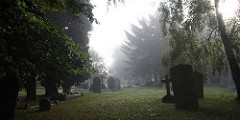By STEPHEN HAVEN
Each evening my half-coon hound dog buries her snout
In her foul dish then comes up singing, moans, complains
About her condition, until I hook her up, let her shit
And piss among the graves—who’s watching, anyway?—
The groundskeepers all home by then, their evening shows
Just flickering, the trees along the forested edge
Leaning as always toward distant centuries.
I mean no disrespect, consider myself half a naturalist,
Then like some homespun anthropologist
Who does not need to dig to question how his people live,
I hover over a watchtower that separates two graves:
Must have been Jehovah’s Witnesses. Whenever I encounter
Their free subscription at my door, I ask them in,
Offer always a drink, all due respect
To my fellow citizens, certain that their strange belief
Gave Hitler no quarter. Now this one gives me succor:
Carpenter the last name, DAD: KING OF THE
REMOTE CONTROL at the tiled foot of the tombstone,
His favorite shows somewhere staying the channel.
Otherwise, this would not be paradise. Right next door,
The Cooks’ black stone bowling ball, as if that’s what
Their lives were for. Then in the alley
Between their graves, they’ve scored a spare,
Three fallen pins, another marker set next to them:
If tears could
Build a stairway
And Memories a lane
I would walk right up
To Heaven and bring
You home again
And here, in spades, a lover of cards, a chiseled Royal Flush,
The man lying for all eternity under the best possible draw
As long as the game is pure and there are no wild cards.
Some take their stand on their names only, and some
Are blank stone, and some burn batteries all night long,
Small running lights, carving a human space. O cracked globe,
O Saturn-like rings, O naked cupid sitting on a pole,
This father buried 1997, his wife born 1953 and counting,
A metal dragon fly, “Peace Be With You,” shoved in his soil,
And next to him, no silence like this, his thirteen year old:
She once loved scarecrows, two on either side of her, sunflowers
No doubt plucked from some department store shelf
As if the girl’s mother, unwilling, unschooled,
Walking among the dead, were forced to play
The Artist of the Beautiful, and lacking the tools
Turned to the Tiresias of some Wal-Mart to drink our blood,
The bric-a-brac, the jingles we keep coming back to.
This is what he says when he speaks for us:
A planet, its orbit, another radiance in the ground, the curved
Wink of the moon, the young girl’s dates burning in that circle.
Stephen Haven is the author of The Last Sacred Place in North America (2012, winner of the New American Press Poetry Prize). He has published two previous collections of poetry, Dust and Bread (2008, for which he was named Ohio Poet of the Year), and The Long Silence of the Mohawk Carpet Smokestack (2004). He directs the MFA Program in Creative Writing at Ashland University, in Ohio. He was twice a Fulbright Professor of American literature at universities in Beijing.
[Purchase your copy of Issue 02 here.]




